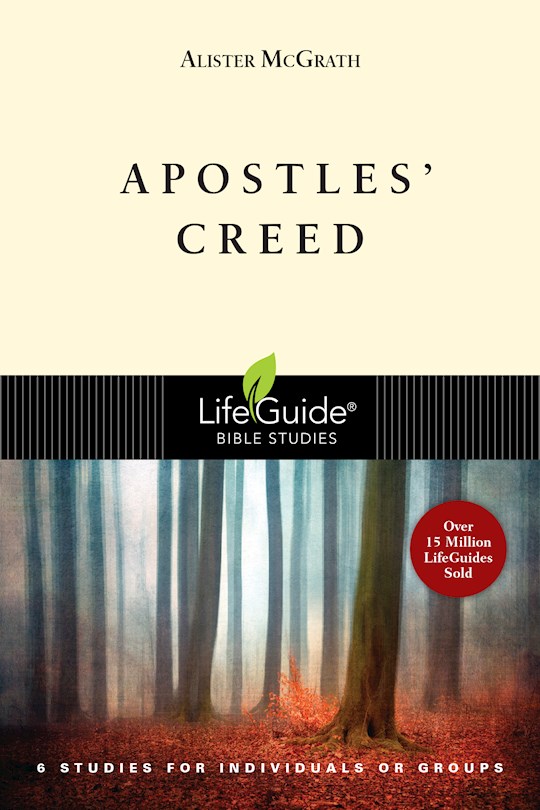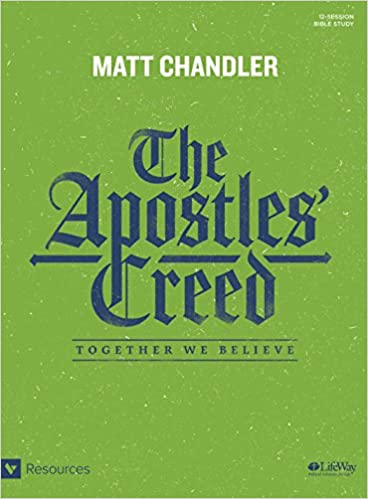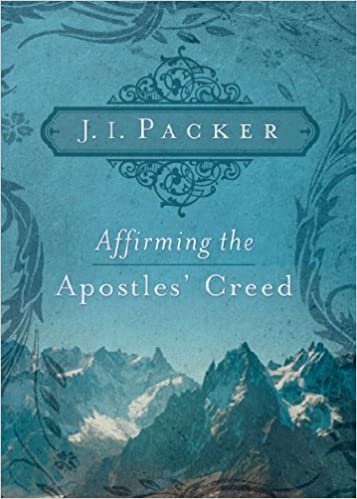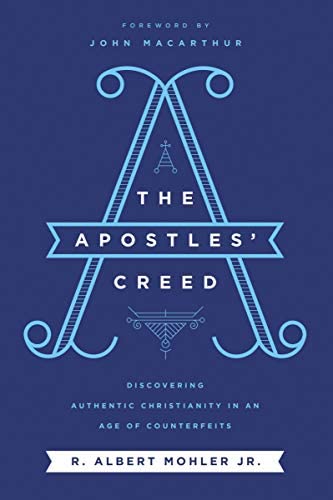Click here to return to Blog Post Intro
Apostles’ Creed by Alister McGrath

Suffering is a mystery that causes anguish to many Christians. It seems to call the love of God into question. The suffering of Jesus Christ on the cross at Calvary does not explain suffering. It does, however, reveal that God himself is willing and able to allow himself to be subject to all the pain and suffering that his creation experiences. We are not talking of a God who stands far off from his world, aloof and distant from its problems. We are dealing with a loving God who has entered into our human situation, who became human and lived among us as one of us.

The Apostles’ Creed: A Guide to the Ancient Catechism by Ben Myers

Suffered
With a painful jolt, we recognize that all is not well in The Apostles’ Creed. Jesus “suffered.”
One of the main criticisms of The Apostles’ Creed is that it contains no account of the life and ministry of Jesus. However, the creed was never intended as a substitute for the Gospels, so it doesn’t try to include all the details but only reminds us of the larger narratives and to focus our attention on Jesus’ identity as divine and human, Son of God and Mary’s son.

Under Pontius Pilate
The creed isn’t a list of concepts and ideas. At the center of the creed is a story, or at least the summary of a story. That’s how one of history’s most dubious characters, Pontius Pilate, finds his way into the creed. His name prevents us from turning the Christian faith is not a set of general truths about the world. It reminds us that the gospel is not an idea but a fact.
We all respond differently to Jesus’ story, but the story itself doesn’t change. The same Jesus, born of Mary and condemned by Pilate, is always at the center.
Was Crucified
In ancient Roman culture, the whole purpose of life was to acquire honor and to shun whatever might diminish one’s reputation. The message of a humble Lord was a shocking thing to hear. The message of the cross inverted the ancient values of honor and shame.
In the Roman Empire, crucifixion wasn’t only about death. It was about public disgrace. In a culture of honor and shame, the pain of the soul—humiliation—can be even worse than the pain of the body.
The world was saved by Jesus’ shame: that is the scandalous message of the cross.
Died, and Was Buried
Everyone comes into the world through the womb and departs into the tomb. In Gregory’s words, “The birth makes the death necessary.”
Because in Jesus, God fully shared our condition, there is no human experience that can alienate us from God. Christians confess that Jesus’ death is the turning point of history.
The Apostles’ Creed: Together We Believe by Matt Chandler

Suffering is an inevitable part of the human experience. The degrees of suffering might differ from person to person, but everyone experiences periods of suffering.
The cross is a visceral, visible picture of the love of God for you in Christ.The death of Christ reconciles us to God. The death of Jesus purchases a people, creates the church.
Believing in Christ doesn’t exempt you from suffering. In fact, some suffering may result because of your faith.

The Roman Empire asserted control through brutal practices like crucifixion, a form of execution reserved for people who posed a threat to Rome. Often the condemned were crucified along busy roads as reminders that Rome had power over life and death.
From the beginning of history, sin has required death as its penalty. From the time of Adam until the time of Jesus, sacrifice was part of the relationship between God and His people.
The Father gave His Son to suffer our punishment for our sins. The resurrection demonstrated that the Father accepted Jesus’ payment for our sin, and it also demonstrated Jesus’ authority over life and death.
Affirming the Apostles’ Creed by J. I. Packer

“Suffered.” This word carries not only the everyday meaning of bearing pain, but also the older and wider sense of being the object affected by someone else’s action. The Latin is passus, when the noun passion. Both God and men were agents of Jesus’ passion. God’s purpose at the cross was as real as was the guilt of the crucifiers.
“Under Pontius Pilate.” Hitler will be remembered as the man who gassed the Jews, and Pilate, a nonentity otherwise, goes down in history as the man who killed Jesus.
“Was crucified.” This was the standard Roman way of executing criminals. Jesus knew on the cross all the pain, physical and mental, that man could inflict and also the divine wrath and rejection that my sins deserve; for he was there in my place, making atonement for me.
The Apostles’ Creed: Discovering Authentic Christianity in an Age of Counterfeits by R. Albert Mohler, Jr.

Suffered Under Pontius Pilate
In Galatians 6:14, Paul instructed Christians to “boast” in the cross of Christ. Christians, however, sometimes forget that Jesus did not merely die for us; he also suffered for us.
In Isaiah 52-53, the prophet reveals five key components of the suffering servant:
- Promise of God that founds and secures the Servant’s ministry.
- Mission of the servant.
- Innocence of the Servant though he suffers as one guilty.
- Extent of the sacrifice of the Servant.
- Way of the cross—through the Servant’s suffering comes vindication.
The suffering Servant comes to bear grief, carry sorrows, and stand afflicted among man and God. The intentionality of the suffering resounds from the words, “pierced for our transgressions…crushed for our iniquities…with his wounds we are healed.”

That Jesus experienced suffering as fully human only magnifies the glory of his intentionality and obedience to suffer and fulfill the prophecy of Isaiah.
Jesus’ suffering bore the iniquities of the people. In so doing, Jesus satisfied God’s wrath against sin. Jesus satisfied God’s judgment. Jesus satisfied God’s holiness. Nothing else need be done. It was finished.
In Philippians 3:10-11, Paul desired to imitate his Savior because he knew the way of glory comes through the way of the cross, “That I may know him and the power of his resurrection, and may share his sufferings, becoming like him in his death, that by any means possible I may attain the resurrection from the dead.”
Indeed, Christ suffered under Pontius Pilate—recognizing a historical event—and thus, we are saved. Pilate, the Roman governor, tries to keep Jesus off the cross. He found the accusations levied against Jesus lacking and baseless. In his final plea, he asks the mob, “Shall I crucify your King?” The leaders exclaim, “We have no king but Caesar.” In that moment, the people of God reject him as their king and espouse their allegiance to a worldly ruler. Meanwhile, Jesus remains silent. Like a sheep before the slaughter, he silently endured the rejection of a people he had brought into existence.
Was Crucified, Dead, and Buried
The fact that a horrifying instrument of execution in the Roman Empire has been turned into a symbol of love, beauty, and devotion requires an explanation. That explanation is called the New Testament. The message of the cross is the good news of salvation, and the story of the cross is the story of God’s love for sinners.
The Apostles’ Creed takes us to the central truths of our salvation: that Jesus was crucified on a cross by the act of scornful men, that he truly died, and that after his death he was buried—all of this in perfect fulfillment of the plan of God.
The message of the cross offends prideful and darkened minds. The cross requires an acknowledgment of sin and the impossibility of any works-based salvation. The atoning work on the cross reveals the fullness of God’s nature and character. In the crucifixion, humanity observes the depth of God’s hatred toward sin. In Christ’s death, God’s people view the tragic consequences of our rebellion. In the cross, God’s people also learn the depth of God’s love. He does not leave his people in their sin, damned to an eternity in hell. He rescues them from the grip of Satan by delivering his own Son.
Jesus’ death on the cross defeated death, broke the chains of Satan, and set the captive free!
The words crucified, dead, and buried reveal the foundation of the Christian hope.
Believers who desire to see the gospel of Jesus take root in their homes, nation, and around the world, must preach the cross. The church fathers enshrined the cross in the Apostles’ Creed for the health and vitality of the church. Today, Christians must recapture again the glory of this affirmation—the inexhaustible love of God in Christ for you in the words “crucified, dead, and buried.”
